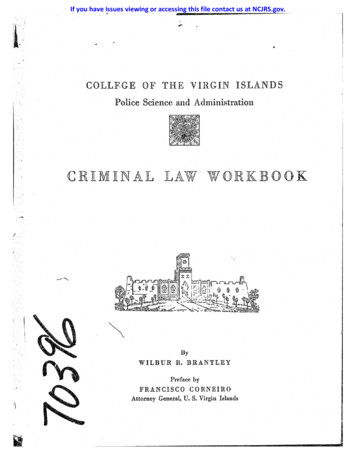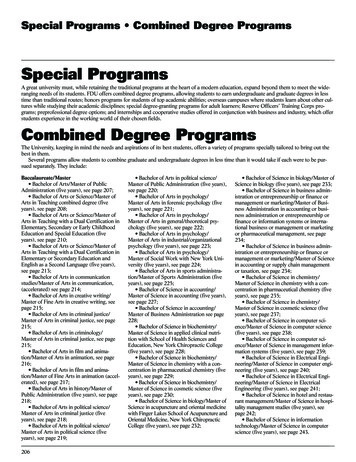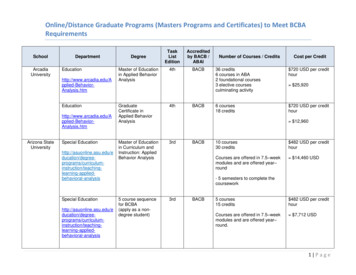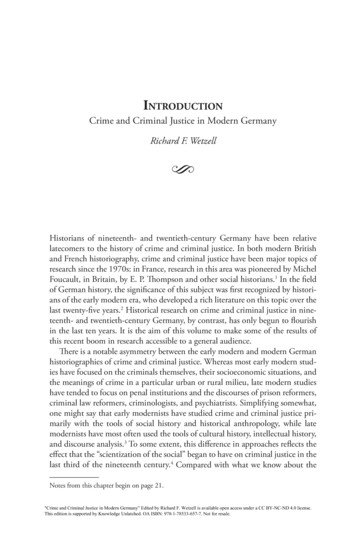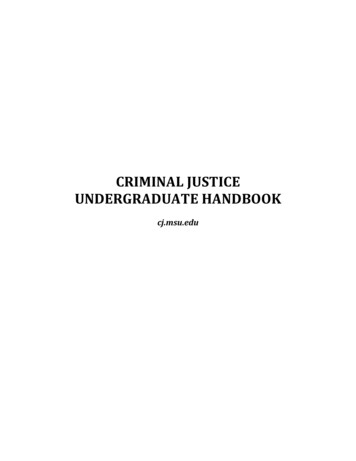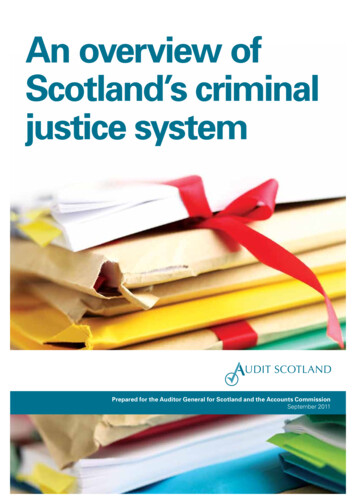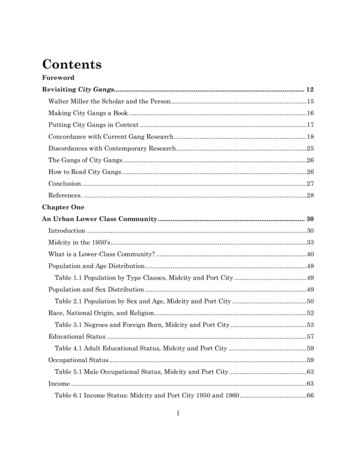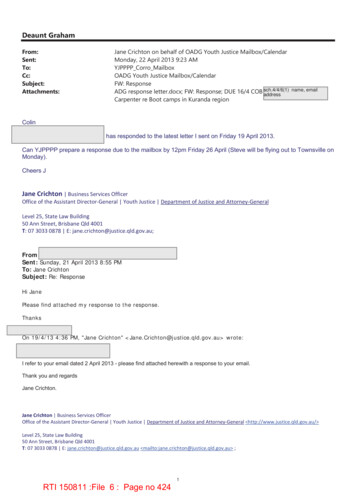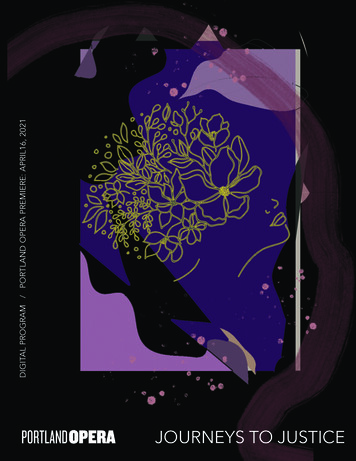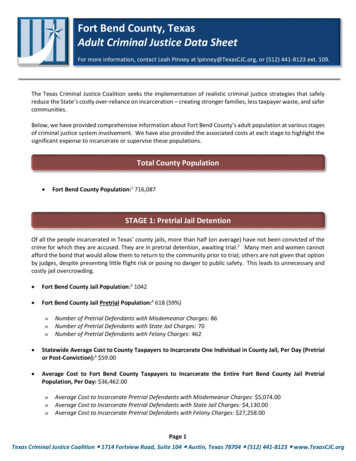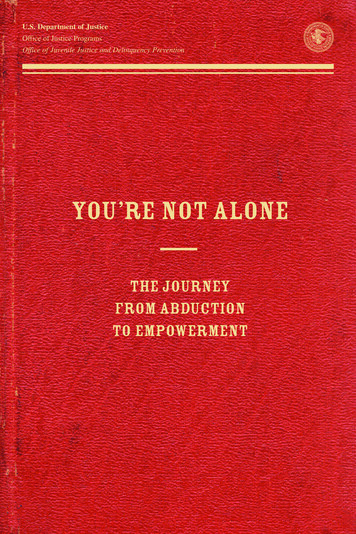
Transcription
U.S. Department of JusticeOffice of Justice ProgramsOffice of Juvenile Justice and Delinquency PreventionYou’re Not AloneThe Journeyfrom Abductionto Empowerment
You’re Not AloneThe Journeyfrom Abductionto Empowerment
U.S. Department of JusticeOffice of Justice Programs810 Seventh Street, NW.Washington, DC 20531Michael B. MukaseyAttorney GeneralJeffrey L. SedgwickActing Assistant Attorney GeneralJ. Robert FloresAdministratorOffice of Juvenile Justice and Delinquency PreventionOffice of Justice ProgramsInnovation Partnerships Safer Neighborhoodswww.ojp.usdoj.govOffice of Juvenile Justice andDelinquency Preventionwww.ojp.usdoj.gov/ojjdpThis document was prepared by Fox ValleyTechnical College under cooperative agreementnumber 2005–MC–CX–K116 from the Office ofJuvenile Justice and Delinquency Prevention(OJJDP), Office of Justice Programs (OJP), U.S.Department of Justice.Points of view or opinions expressed in thisdocument are those of the authors and do not nec essarily represent the official positions or policiesof OJJDP or the U.S. Department of Justice.The Office of Juvenile Justice and DelinquencyPrevention is a component of the Office of JusticePrograms, which also includes the Bureau ofJustice Assistance, the Bureau of Justice Statistics,the National Institute of Justice, and the Office forVictims of Crime.This edition is the first printing.
INTRODUCTORY LETTERI want you to know how happy we are that you have returned home. I also want you to knowthat you are not alone.Every day, in communities across the country, children are abducted by people they know,by family members, by people they have met on the Internet, by acquaintances, and bycomplete strangers. It is estimated that more than one million children are reported missingeach year. Fortunately, many of these children return home safely within a short period oftime. Unfortunately, some do not return at all. And some children who return face majorobstacles in their road to recovery and healing.Several years ago, the Department of Justice, through its Office of Juvenile Justice andDelinquency Prevention (OJJDP), pledged itself to helping the victims of abduction, whetherit be the families, the siblings left behind, or the children themselves. We have created resour ces to help these families cope with the aftermath of abduction and begin the healing process.With the assistance of family members who have experienced firsthand the abduction of achild, OJJDP created a guide for families of missing and abducted children, titled When YourChild Is Missing: A Family Survival Guide—one of the resources most widely requested andused by families of missing and abducted children. In 2006, we created What About Me?Coping With the Abduction of a Brother or Sister, which helps siblings who were left behindcope in the aftermath of the abduction.This third document, You’re Not Alone: The Journey from Abduction to Empowerment, wasprepared with the assistance of young adults who were themselves abducted as children andwho are walking the path of healing and recovery. It is designed to help others who experi ence abduction begin to put their lives back together. Each abduction is different, and so isthe path to recovery. And though the road to recovery is different for everyone, the destina tion is the same—to find empowerment and normalcy, and to live as full a life as possible.It is my sincere hope that this document will help you on your road to recovery. I lookforward to the day when we no longer have to search for missing children. But until thatday comes, I believe that this document, and those that preceded it, will help children andfamilies move forward on their personal journeys from abduction to empowerment.J. Robert FloresAdministratorOffice of Juvenile Justice and Delinquency Prevention1
LETTER FROM THE AUTHORSLike you, we are survivors of abduc tion. We were abducted by strangers,by a parent, by someone known tothe family, and by someone webelieved was an online friend. Eachof us had different experiences,which ultimately led us downdifferent paths. Like you, wereturned from those experiencesand had to adjust to a wholenew life.Even though we are allsurvivors, we are also much more.We are college students, musicians, dancers, artists, athletes,and advocates. We are daughters and sons, brothers and sisters,boyfriends and girlfriends, friends, roommates, and communitymembers. One day we will be husbands and wives, parents, teachers,forensic psychologists, and lawyers.As you are all too aware, the journey can be tough. Our experiences—the abduction itself,our responses to it, and other life events—have shaped our lives in ways that we didn’t alwaysexpect. We are who we are today because we chose to turn a negative experience into apositive one and to move forward on our journey from abduction to empowerment.The paths we followed have not always been direct or smooth, but we have realized thatthe progression of life goes on. We want you to know that you can make choices and moveforward, just as we have. We stood right where you are standing now—wondering what wasin store for us in the future, how we were going to get there, and what we were going to face inthe process. We are happy to tell you that we not only survived, but we have learned to thrive.We have been where you are in your journey. You are not alone. As difficult as it may seem,you will get through this. It will get better. You will learn and you will grow. It is possible foryou to continue on in your life and become who you want to be. We hope you will let uswalk beside you as you go through your journey.2
This book was created for and by survivors of abduction, with the guidance and assistanceof the Department of Justice. We are telling our stories because we hope they will help youbelieve in yourself and give you hope for your future. Please know that what happened toyou is your story, and you can tell it if you want, how you want, when you want, and towhom you want.Always remember that the abduction was not your fault. You survived something that wasout of your control. You can reassume control and, in the process, come out stronger. Yourlife is different now—there is a “new normal.” That is what we mean by the journey fromabduction to empowerment. It’s the road you walk as you heal and grow, and learn to takeback the reins of your own life.We cannot say exactly how you should move forward. We can tell you, however, that yourexperience does not have to destroy your life. Our hope is that our words will give youencouragement and ideas about where to start. The most important thing to remember isthat you have a life ahead of you and that it can be what you want it to be.You are a survivor. We hope that you will choose to keep hoping,move forward, and recover your joy in life. Take care of yourself.Don’t be too hard on yourself. The journey will take time. But youwill make it.Welcome home!3
ABOUT THIS BOOKOne step at a time, one footin front of the other. That’show you move on. There issomething more for you todo . . . you survived for areason! — Maggie“In 2007, we were invited to be part ofwriting a book for others who survived anabduction and returned home. Many of usremember wishing we had someone totalk with in those early days who had beenthrough a similar experience. We all knewthat we wanted to be part of this projectbecause we saw its potential to help otherswho were probably feeling as frightened and alone as we once did.”We came together with a team of professionals who had worked on similar documents to shareour thoughts and ideas about what someone in these shoes would need to know. For many ofus, this was the first time that we had a chance to talk to other survivors. We realized howimportant it was to connect with someone else who had a similar experience, even if all thedetails were not exactly the same. We hope that is what this book can do for you.The book is divided into five sections, each dealing with different aspects of your personaljourney from abduction to empowerment. The first section focuses on the journey itself andwhat you might expect along the way. The second discusses finding those who can help youthrough your journey. Section three is about retaking control of your life and making thechoices that are right for you. The fourth section talks about roadblocks you may face in theprocess, and some possible ways that you can handle them successfully. The final section dealswith finding the “new normal” in your life.Each section includes a personal letter from one of us with our thoughts to help you throughyour journey. To make sure that we had input from as many different perspectives as possible,the team reached out to other young people who had been through similar experiences.Throughout the book you will see quotes from the five of us and from four other survivorsof abduction—Josh, Lindsey, Sarah and Trevor. We want to thank them for having the courageto share their experience and taking the time to share their thoughts.This book is a resource for you. Whether you read every word, skimpieces that grab your attention, or put it down until you’re ready tolook at it again later, we hope it helps you understand that you trulyare not alone.4
SECTION 1: YOUR JOURNEYYou may be picking this book up inthe days following your abduction, orit may be months or even many yearssince your abduction. No matterwhere you are, how long it has been,or what level of healing you havefound, it is okay. This is a journey—a process. Everyone handles it dif ferently. Just know that as difficultas it may be, things get better.There is hope. What’s important isthat you are ready to hear fromothers who, like you, havesurvived an abduction.You will have good days and bad days in the months and years to come. Sometimes you mayfeel your journey will never end. Sometimes it may seem you are retracing the same steps overand over. Some journeys take longer than others.What is important is not tocompare yourself to anyoneelse. The circumstances of yourabduction and your survivalwere unique to you. Yourhealing process will be uniqueas well.re’s no sign that says you’ve“Thearrived, you’re here, but thingsdo align and start working. Itis possible to be happy. Whatyou’ve gone through isn’t theend of the world, because you’restill here. We can’t show you howto get over it, but we can showyou it is possible. — SamYour home life will probably be differentand may never go back to the way it usedto be. If you were gone for a while, orabducted at a young age, you may notremember what it was like before your abduction and you may need to get to know membersof your family from scratch. Your routine, as you remember it, may be completely differentnow. You may feel that your abduction has become a point of reference—there will always be a“before” and an “after” this happened to you. This may be sad, frightening, and confusing all atthe same time.”5
You may feel that you need some space to deal with what has happened, but that others donot want to let you be alone right now. You may feel torn between what you want and need,and what others think you want and need. You may want to talk, or you may want to bequiet. You may want others to be near you physically, or you may not want anyone to touchyou. Sometimes all you want is to be alone, but at the same time you might be afraid ofbeing alone.You also may feel guilty for what happened, or others may make you feel that way. You mayrealize that your parents and siblings also experienced trauma, that life changed for themas well. As a result, they may have their own issues to work through. They may be overprotec tive or seem distant. It will probably take time to sort through everything and find thebalance between what you need and what they need.It will take time to process what happened to you. It took time for all of us as well. Althoughtime really does make things better, it cannot make what happened go away. All you can do ischoose to make the best of it, and to make an effort to turn the negative experience you wentthrough into something positive.We found specific strategies that helped us along our journeys. Keep in mind that the samestrategies didn’t work for each of us. As you embark on your journey, you will have to findout what works for you and whatdoesn’t. Take your time, and trustyour instincts.Getting better doesn’t always“happen in a straight line. It comesand goes in waves, or cycles, liketaking two steps forward and onestep back. It’s a journey you movethrough on your way to the otherside. The important thing, though,is to keep going. — Tamara”6For information onadditional resources,please see “Where to FindMore Help” on page 60.
TALKING TO SOMEONETalking about what happened is animportant part of your healing. Thisis not something that you can handleon your own. You will find that manypeople will want to talk with you, andyou may even feel bombarded by theirinterest in you. As you begin to openup, make sure that you talk about it inyour own time and in your own way.Use this as an opportunity to take con trol of this portion of your life again.Sometimes you may want to talk about what happened; other timesit’s the last thing you want to discuss. Remember that, apart fromlaw enforcement’s investigation of your case, you have to share onlywhat you want to share, and only when you are ready.When you are ready, find someone you trust. Some of us confided in our parents—theirunconditional love and support has helped us throughout our journey. Others of us found itdifficult to talk with parents and other family members who were also struggling with how tocope. Some of us who returned from a family abduction also found it difficult to talk with aparent or with other family members who were, in many ways, strangers to us. Many of uswere successful in finding a counselor or therapist who helped us along our journeys.We all learned that the key to finding someone to confide in was to find someone we trusted.This may have been someone who was helpful in our lives before the abduction, or someonenew. We all found it important to find someone who was objective without being judgmen tal, who let us speak in our own voices and in our own time, and who had our interests atheart. It was important to find someone who could provide us with strength and guidance tohelp us make our own decisions.g the“Igprnoobrinlem doesn’thelp.” — AliciaMost important was finding someone justfor us with whom we felt comfortable.7
Remember, you cannot do this alone. Asking for help is not aweakness. It is a strength and an important part of the healingprocess. Here are some of the people we turned to when we neededthem the most: Parents. Brothers and sisters. Other family members—grandparents, aunts, uncles,and cousins. Best friends. Boyfriends or girlfriends. Counselors. Clergy. Teachers. Coaches. Friends. Other trusted adults. Others who had undergone similar experiences, like asupport group.Keep in mind that what you need maychange from moment to moment, andthat you may need to talk with differentpeople about different aspects of yourlife and the abduction. Each of us foundmultiple people whom we trusted indifferent ways to help us with differentparts of our journey.en something like this“Whhappens, it leaves a void insideoof you. You basically have twchoices: You can fill it withnegative things, like alcohol,drugs, or promiscuity; or youdcan fill it with good works ana good heart. — Alicia”FINDING POSITIVEOUTLETSThere will be times when you wish that things could go back to the way they were before theabduction, and times that you wish it had never happened. There will be times when yourworld seems grim. This is normal and to be expected. When you find yourself thinking,“What if?”, engaging in activities that you enjoyed before the abduction may be a healthyoutlet for your emotions now. You might also want to try a new activity to see if it helps.If it doesn’t, try another until you find a positive outlet.8
Here are some things that worked for us: Keeping a journal.Dancing.Competitive running is whatAttending a class.saved me. I had to get back toPainting and drawing.what I loved, back to whatListening to music.defined me. I fought so hardReading.for it. I was not going to letPlaying an instrument.my abductor take that awayExercising.from me. — MaggiePlaying sports.Going to the movies.Taking up a new hobby.Going shopping.Spending time with family.Spending time with positive and good peoplebecause they will naturally bring you up and youwill be likely to do positive things for yourself.Setting a personal goal to do something new everyday, even if it is something very small.Spending time with friends who let you talk about it if youwant to, but don’t force you to talk about it if you don’t.“”feel bad about yourself, do something that“Ifwillyoumakeyou feel good, like getting your hair cut,or something that you used to do before the abduction. Even if it feels weird. Spend time with otherpeople, but don’t be afraid to be alone. No one willheal like you, and patience with other people is thefirst step to your own healing. — Lindsey”9
TAMARA’S STORYLife, I have found, is not so muchabout the endpoint, but about thejourney and how one responds toexperiences along the way. It is filledwith hidden corners, obstacles that mayseem impossible to overcome, mightytriumphs, pain, fear, utter happiness,passion, and events one could neverimagine until they become a reality.I would like to share part of my life storywith you, a story that begins when I was 16 years old and was kidnapped atgunpoint by a man I did not know. I open myself to you because we have twothings in common. We were abducted and made it back alive, and we both havethe ability to take back what was snatched from us—the freedom to live our lives.The importance of telling you my story lies in the things I have done to empowermyself in response to that experience. It lies in my journey, filled with hard work,healing, challenges, and triumphs over the trauma. As much as I would love to saythat one day you will wake up and the work will be over, it will not. However, itdoes get easier with time.I hope that sharing my successes and the mistakes that I have made in dealingwith my abduction will help you on your journey. I have turned my own journey,although it has had its hardships, heartbreaks, and pain, into something amazing,not because I am a superhuman in disguise, but because of how I chose torespond to what happened.My name is Tamara and I am 21 years old. I will be finishing my bachelor’sdegree in June 2008. I have been dancing since high school and I spend as muchof my free time as possible out with friends, my family, at the beach, or curling upwith a good book and my kitty. When I was 16, my life took an unexpected turnwhen I was kidnapped from my hometown.Before that point I was an ordinary teenager—boy crazy like all of my friends,excited about my first real prom still a year away, and 2 years shy of graduating10
high school. I played sports, was a straight “A” student, and was always doingsomething goofy to make my friends laugh. The summer I turned 16 I felt on topof the world. A week after my 16th birthday, on July 31, 2002, when I was at alookout point with one of my best friends, I was abducted at gunpoint and myfriend was left behind, tied up. I was then to endure one of the most difficultexperiences of my life.A few hours later, my captor took another young woman. Together we chose tofight back and although we were unsuccessful, we did not give up. Approximately16 hours later we were found, largely thanks to the success of California’s firstAMBER Alert. After he fired a shot from his gun, our captor was shot to death bythe police. Moments later it was over. We were safe. We had survived.THE FIRST FEW HOURSWe were first taken to the hospital to ensure that we were okay. Upon our arrival,we were taken inside on gurneys, covered head to toe with sheets. The media, viathe AMBER Alert, had been airing our story from the beginning, and as a resulteveryone wanted to be the first to get a picture of us or catch us on film.Everything became a rush afterthat. Detectives questioned usand put us into separate roomsas the hospital performed a fullmedical examination to collectany physical evidence. Thatexperience felt like anotherviolation all over again, but itwas necessary. At the time I didnot understand what was goingon or why I had to undergo somany procedures. I was still ina state of shock from the realityof being kidnapped, and thenthe reality of being found.d toen I came home, everyone wante“Whn’thug me. The problem was that I dide, Iwant to be touched. At the same timdedunderstood that it was what they neeat theyto help them heal and deal with whg. So,had been through while I was missin. AndI thought okay, go ahead and hug merealizedwhen I hugged my family, they alsotothat I was uncomfortable and neededndbe alone. We needed to reestablish bouwhataries. We needed time to figure outwas okay and what wasn’t.”11
Once they finished with us at the hospital, we were taken on a private plane backto my hometown. In the days following, I found that I had suddenly become acelebrity. My name and photograph were splashed across newspapers.Because of the media attention, everywhere I went people recognized me. Somesimply stared; others would whisper; some would approach me and say, “You’rethat girl.” I became, in their eyes, that girl who was kidnapped in the summer of2002. But I did not allow that to define who I was or who I am today. True, theexperience is a part of me and has helped shape me, but in no way does it encom pass all of me, nor will it encompass all of you. Although some people may try toforce that identity upon you, we choose who we want to be—not them.I chose to be grateful, not for the fame, but for the gift I was granted: the gift ofseeing how much people cared, and how compassionate they could be. It’s easy toforget that, especially after being kidnapped. But with this perspective I was ableto see the vast amount of good there is in the world. So many people whom Inever knew—and unfortunately may never get to meet—worked tirelessly tobring me home, as they did for you. That is something to think about. We matterthat much to people—even ones we do not know, who were willing to do every thing within their power to protect us. We were saved and are here for a reason.It’s an incredible feeling to know that.RETURNING HOMEComing home, I faced many obstacles, some of which I still experience from timeto time. I began to have nightmares every night, and could not sleep. It becameextremely difficult to concentrate in school. Things that used to come easily forme suddenly became a monumental challenge. I was depressed. I cried countlesstimes, but through it all I knew I had a choice. I could choose to dwell on howdifficult things were or I could focus on the positive. First and foremost I wasalive. I had another day to live, another day to make things that much better.Sometimes just getting out of bed was a huge challenge, but I did it every singleday. That may seem like a little thing, but the little things make the biggest difference.From the moment I came home, I chose to look at my abduction in a positivelight. I chose to believe that good will always triumph over evil, that I came homefor a reason, and that something phenomenal was going to come out of my12
day after I was rescued, I had to go“Thewith the detectives to try to retrace thesteps, to take them to all the placeswhere the evidence might be. That wasextremely difficult. The last place Iwanted to be was where it had all started. I had to relive it all, even though allI really wanted to do was to put it allbehind me and move on. But I soonrealized that putting it behind me wasnot going to be as easy as I hoped. I wasable to take my brother with me to walkthrough everything, and that reallyhelped. One of the most importantthings that I learned was that it is okayfor you to say what you need. And it isokay to ask for someone to be with youif you want that.having been kidnappedand the hardships Ifaced. I believed thatgreatness could befound in the darkestof corners and choseto actively find thatgreatness.As I was trying tocope with the negativeemotions that werechurning inside of me,especially the fear thatthings would not getany better, I made aconscious decision eachday. I asked: How can Imake today that muchbetter than yesterday? I found that focusing on the positive eased the impact thenegative parts had on me.”TAKING CARE OF YOURSELFThrough trial and error I also found that the best thing I could do for myself wasto take care of each of my responsibilities. I was a student and therefore I neededto attend class, do my homework, and turn it in. I needed to eat three healthymeals a day. I had to sleep. I had to get out of bed, shower, and brush my teeth.I fought procrastinating and the tendency to want to curl up under my blanketsand take a break from the world. Giving into that inclination and isolating myselffrom life and friends only made things worse.During the bad times, I needed to reach out to someone whom I trusted andcould talk to. That “someone” had different faces. Sometimes it was a familymember, my best friend, a special person who had become a mentor, or mycounselor. I found that talking to someone was extremely important for me.Speaking to a counselor or therapist helped me tremendously, but talking to13
imes you just need to be selfish and do“Sometsomething for you. I know there are timeswhen I just need to go out with my girlfriends, go to a football game or somethingand be carefree. I need that. If you’re not taking in what you need, you don’t have anything to give. You’ll be stuck at a point ofstagnation. Life’s too short to be unhappy.friends and family enabledme to turn from the thingsthat were bringing medown and focus on thepositives. Most important,we would laugh together.Laughter and humorbecame one of the best outlets. Aside from a big bowl of vanilla ice cream, notmuch is better than laughter.”My counselor was very important to me—he helped me understand that thesechallenges were not permanent and to find positive outlets. He did not give methe answers, but he was there to help me find my own. This helped me trustmyself—which is very important. The kidnapping had made me question myown judgment.It was not as though I would never have learned to trust myself again, but mycounselor helped me accomplish that sooner rather than later. He also helped meregain trust in adult males, for it was an adult male who had harmed me. Moreimportantly, my counselor helped me understand that the man who took meintended to do harm to me, not all adult males. Realizing that not all adult maleswere my enemy helped ease my anxiety, for I sometimes thought that every adultmale I met had ulterior motives.The bottom line was, the man who abducted me took 16 hours away from me andI refused to let him have any more. I arrived at this belief only after my counselorand I worked through and made sense out of what had happened. Those of us whohave had this experience have to navigate a delicate balance when it comes to look ing back at what happened to us. We can choose to do so to help propel ourselvesforward and take back what is rightly ours—the freedom to live—or we can use thememory as a crutch that pulls us down. I still use that thought as a sounding boardto make sure I am on a positive road of healing instead of a road to self-destruction.MAKING CHOICESEven now as I tell you my story I am not finished with my recovery and healing,for it is a journey. It has revealed strengths I never knew I had. Yes, I felt like I was14
in pieces when I came home. But through constant hard work and choosing toremain positive in the midst of each challenge, I became whole again.Some say that my work has helped me survive, but let me tell you, we survivedwhen we made it home. Period. That process of survival is over. The journey fromhere on out is becoming whole, learning to live with passion, laughing with ourwhole heart and soul, and fighting for what we deserve, the absolute best in life.You and I are worth that and so much more. It is only a matter of whether or notwe want it. It is a choice.I have reiterated this notion of choice over and over because it is immenselyimportant to me; it was—and is—my saving grace. As I struggled to deal with badthings in my family life as well as the abduction, I still had the choice to dwell onthe negative or find the positive.Making this choice every day in my life has not been easy. Every time I begin tothink that it is too hard, I remember that I did not give up on myself when I wasgone, and I will not give up on myself now. As my mother told me, “Yesterday ishistory. Tomorrow is a mystery. Today is a gift.”Each day brings us a gift: a blank slate. Our choices become the brush that paintseach stroke of color. We paint our own picture and as we change our mindset, wechange the picture, too. We choose who we want to be and how we want to bedefined. I chose not to remain that 16-year-old girl who was kidnapped on July31, 2002. Instead, I am Tamara, one who is making her own way in life. I amTamara, one who has spoken out to the nation about her story and one who canbe just as effective in her daily life with or without the speeches.In my eyes, you are an incredible human being. I do not need to meet you toknow this, for you have survived and that in itself is a true testament to yourgreatness. The amazing part about coming home is that we can be as ordinary oras extraordinary as we want. What kind of life do you want to live? The choicewas mine, and the choice is yours.15
SECTION 2:CHOOSINGCOMPANIONS FORYOUR JO
and may never go back to the way it used to be. If you were gone for a while, or abducted at a young age, you may not remember what it was like before your abduction and you may need to get to know members of your family from scratch. Your rout

